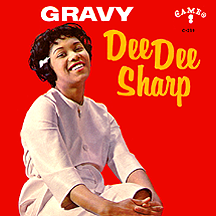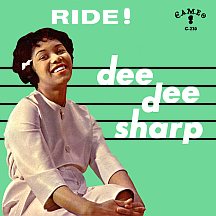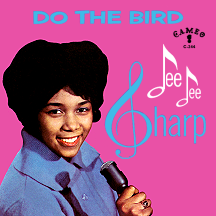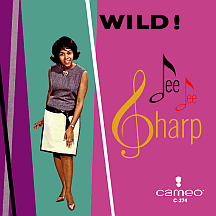DEE DEE SHARP
By early 1962, Philadelphia's Cameo-Parkway record company had been going strong for more than five years but was sorely in need of a hitmaking female act to help balance out its male-idol-heavy roster led by top stars Chubby Checker and Bobby Rydell. Many women, mostly of the pop and teen variety, had recorded for the company (Cameo's very first single release at the tail end of '56 had been by Arlene DeMarco, youngest of the singing DeMarco Sisters), but none clicked until Dione LaRue, a 16-year-old gospel singer and session newcomer, showed up unexpectedly and through a unique set of circumstances struck gold - twice - in a matter of weeks, in the process establishing herself as a premier dance record artist, a counterpart to "Twist King" Checker.
Born in 1945, young Dione (nicknamed "Dee") sang in church as a child and began a semi-professional career at age 13 after answering an ad for piano-playing singers; Willa Ward Moultrie, a formidable Philly-based gospel singer with The Ward Singers (more famous sis Clara Ward included) had run the ad and hired her for background work, providing a strong mentoring influence along the way. This led to some opportunities to help support her family doing studio work around town on pop and R&B sessions, raising at least one of her mother's eyebrows, though mom allowed Dee to follow her dreams...within limits. Attempts to start a singing group with friends at Overbrook High School (attended by other future Cameo-Parkway stars including Len Barry of The Dovells and members of three-quarter girl group The Orlons) never came together, so she opted to take a solo path to potential stardom.
Having worked sessions for Philly's hottest labels, backing Frankie Avalon and Fabian at Chancellor and Freddy Cannon at Swan, Dee's big break came suddenly and spectacularly when she was hired for a Checker session at Cameo-Parkway in early 1962. Producer and label head Kal Mann had her do several prominent lines and duet harmonies on "Slow Twistin'" (...round and round we go now, honey!'). Satisfied with the results, Mann invited her back to take a shot at another dance tune he and Bernie Lowe had come up with, "Mashed Potato Time," inspired in part by the fancy footwork James Brown was layin' down at his much-talked-about stage shows (the song's lyrics contain some oddities; giving credit to '...a guy named Sloppy Joe' as the originator of the dance, while suggesting it can be done to the rhythm of The Tokens' Zulu-influenced megahit "The Lion Sleeps Tonight").
Chubby's "Slow Twistin'" was issued on Parkway without any mention of Dee on the labels. Her recording of "Mashed Potato Time" (some copies designating writers Jon Sheldon and Harry Land, aliases for Mann and Lowe) appeared on Cameo immediately afterwards, giving label credit to Dee Dee Sharp, the professional name Mann had decided on based on her nickname and supposed tendency to sing in the not-too-commonly-used key of D sharp. Both singles debuted on the national charts the first week in March with Chubby's disc predictably in front. By mid-April the two singles were side-by-side in the top ten, just before Dee's solo "Potato" record slipped ahead, peaking at number two on Billboard and number one on Cash Box the final week of April. The newly-christened Miss Sharp was kept very busy, promoting her hit record while continuing high school studies and singing each Sunday in church.
The self-professed tomboy also attended "Charm School" at the insistence of Kal and the Cameo honchos. She was unable to make an appearance in Don't Knock the Twist (her mother, concerned things were moving too fast, the main source of opposition); the low-budget theatrical film featured Checker, the Dovells, Gene Chandler, Linda Scott and others lip-syncing their hits (an uncredited stand-in covered her "Slow Twistin'" role, and poorly at that). The next single, Mann and Dave Appell's "Gravy (For My Mashed Potatoes)," seemed like a bad move to Dee, but Mann was firmly in control. The frequently-used stategy of releasing a near-identical follow-up has historically worked only a small percentage of the time, but in this case it played out as planned; "Gravy" made the top ten in mid-July (meanwhile, all this mashin' madness got further out of hand, inspiring a novelty take-off, Bobby (Boris) Pickett's infamous "Monster Mash," which hit number one right around Halloween). Afterwards, Dee Dee trusted her mentor implicitly and followed his suggestions whether or not she fully agreed. Kal Mann was her main man!
Being in Philly, as many came to realize, worked in her favor (as well as the rest of the C-P roster) as she made many career-boosting appearances on Dick Clark's daily dance fest American Bandstand; Mann and company had perfected a hit formula by '62 and the record company was one of the hottest in the business. In November, "Ride!" (as in '...get on my pony and...') became her fourth (third credited) top ten hit of the year. Jumping on the "Bird's the Word" bandwagon, she hit the top ten one more time in early '63 with "Do the Bird." Mann and Appell came up with some strong non-dance tracks: "Rock Me in the Cradle of Love," "Wild!" (delightfully tame despite its title) and "Where Did I Go Wrong," all singles that performed well below the level of 1962's hits. The B side of the latter 45, "Willyam, Willyam," was a contribution from Billy Jackson and Jimmy Wisner, who'd already been composing songs for other Cameo-Parkway acts; the next single, "Never Pick a Pretty Boy," was theirs as well but by early 1964 Dee's chart run appeared to be over.
In the first half of the 1960s, only Chubby Checker had more dance hits than Dee Dee Sharp. She later lamented Cameo's decision to position her as a "Dance Queen," yet her desire to explore the next level of rhythm and blues material became a reality while she was still with the company. At 18, the comely singing star surfaced on the radar of many eligible bachelors and not-necessarily-eligible skirt-chasers, though I won't say which was which; Gene Chandler and David Ruffin of The Temptations showed interest and she actually dated heavywieght boxing champ Cassius Clay for a time, developing serious feelings for him before finding her faith clashed with the Islamic beliefs that resulted in Clay's conversion and permanent adoption of the name Muhammad Ali.
She met composer-producer Kenny Gamble (with Jerry Ross, he'd broken through with The Sapphires' early-'64 hit "Who Do You Love" and had worked on records for Cameo-Parkway by The Swans and Candy and the Kisses). He penned "I Really Love You" with James Bishop, a sophisticated soul song that returned her to the charts in late 1965; the single was also one of Gamble's early collaborations with producer Leon Huff. Romance developed between Kenny and Dee (she admitted to slapping Diana Ross for flirting with her man!) and he helped arrange her move to Atlantic Records' Atco subsidiary in 1966; they were married the following year. No major hits resulted, though there was a well-received duet with Ben E. King ("We Got a Thing Going On") in 1968.
Kenny started his own Gamble label in 1966 and by '68, due largely to a string of hits by The Intruders, had gained a reputation as a hot young independent music executive. When Dee's Atco contract expired, she briefly joined Gamble Records as an artist, then got into the management side of things for a few years. A comeback in the mid-1970s, first with TSOP (a cover of 10cc's "I'm Not in Love" hit the Soul charts) and then as Dee Dee Sharp Gamble on Leon Huff and husband Kenny's super-successful Philadelphia International Records, gave her the opportunity to show off a mature, well-developed vocal range. Although she gained many new fans during this period, millions of people still prefer Dee Dee Sharp's early-'60s Cameo-Parkway classics from the time she was Philadelphia's top solo female star and America's second most popular pedaler of dance tunes and trends.
NOTABLE SINGLES:
- Slow Twistin' - 1962
with Chubby Checker - Mashed Potato Time - 1962
- Gravy (For My Mashed Potatoes) - 1962
- Ride! - 1962
- Do the Bird - 1963
- Rock Me in the Cradle of Love - 1963
- Wild! - 1963
- Where Did I Go Wrong /
Willyam, Willyam - 1964 - Never Pick a Pretty Boy - 1964
- Deep Dark Secret - 1964
- I Really Love You - 1965
- It's a Funny Situation - 1966
- My Best Friend's Man - 1966
- We Got a Thing Going On - 1968
by Ben E. King and Dee Dee Sharp - I'm Not in Love - 1976
- I Love You Anyway - 1981
as Dee Dee Sharp Gamble





